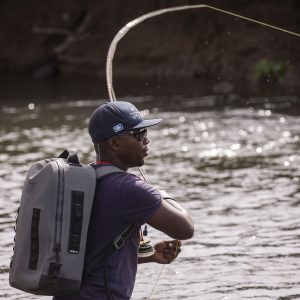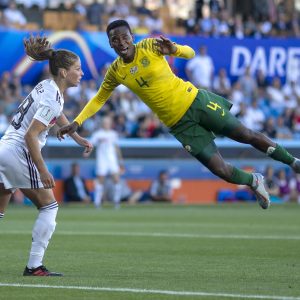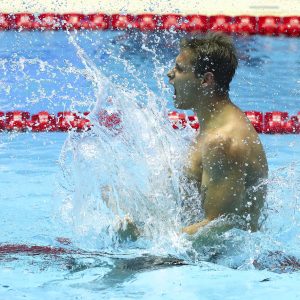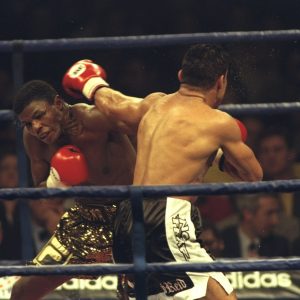Darian Townsend’s mission to nurture future swimmers
The South African-born and gold-medal-winning Olympian is looking to build a strong swimming team at Ottawa University where he is now coaching after finishing his career in the US.
Author:
16 January 2021

The most prestigious stage of all was set. South Africa had come close to setting a new world record in the heats and took to the pool deck in Athens for the Olympic 4x100m freestyle final.
Largely ignored by the international media in the build-up to the race despite their earlier performance, all eyes were on the likes of Michael Phelps and the Americans and Ian Thorpe and the Australians. However, for the South African contingent, the question was: could their boys pull off the biggest upset of all?
Roland Schoeman and Ryk Neethling were clearly in form, as was the slightly less-known Lyndon Ferns. But could third-leg swimmer Darian Townsend – the untested teenager from Pietermaritzburg – hold his own against the world’s best sprinters? Diving in with a body-length lead after the first two legs, could he withstand the pressure of the chasing pack?
The answer: an unequivocal yes. Townsend maintained the lead all the way, and as anchor-leg swimmer Neethling powered to the finish, he smashed into the wall to stop the clock at 3:13.17, a new world record and a first-ever Olympic relay gold for South Africa.
Related article:
Sixteen years, and many, many races later, Townsend finds himself in the position of aiming to inspire others to do the same. In September 2020, he was named head coach of Ottawa University’s swimming team in Arizona in the United States and is relishing the chance to first build a team and then motivate and guide them to similar exploits.
But it’s been far from a smooth journey between Olympic glory as a teenager and head coach of an American college. There’s been some heartache on the way as he felt abandoned by his own swimming federation, despite his medal-winning and record-breaking efforts over the years. For this reason, he took the tough decision to switch nationalities.
At the time of the 2004 Olympics, Townsend was the only one of the quartet still based in South Africa, with the other three all studying in Arizona on swimming scholarships. He would soon follow the path to the US though, first to Florida and then Arizona as well.
“The move wasn’t easy, but it was the right decision. Moving to another country is never going to be easy, but I got used to the way of life in America and in college and have thoroughly enjoyed living here since then,” said the now 36-year-old.
Related article:
Townsend soon discovered that, while it was an incredible experience, winning Olympic gold at such a young age heaped additional pressure on him.
“I felt that others expected more from me after winning a gold medal. Because of this I put a lot more pressure on myself to win. It took me a while to get used to that feeling,” he admitted.
“In South Africa I was used to always winning my events at local meets and also winning by a fair distance, but in the US Collegiate system, there is always someone to race and challenge you. I wasn’t able to relax at any meet. Having an Olympic gold medal also put a target on my back as others wanted to beat me. This made racing at even small meets tough.”
Taking up American citizenship
While much of the focus post-2004 was on the better-known Neethling and Schoeman, Townsend was quietly notching up a not insignificant record of his own.
“I was young and, yes, winning an Olympic gold medal is the ultimate in most athletes’ careers. However, I made sure to reset my goals each season and work towards those every day.”
The almost-two-metres-tall star claimed multiple National Collegiate Athletic Association (NCAA) titles and all-American honours, and in 2009 broke the world short-course record in the 200m individual medley (IM) at a World Cup meet in Berlin. In 2010, Townsend finished second overall in the Fina World Cup Series and the following year claimed victory in the 200m IM at the US Winter National Championships.
“My college career was a great time in my life. I learned a lot about who I am as a person through many tough lessons. I also had a great time competing against some of the world’s best swimmers. My most memorable individual highlight was definitely breaking the world record in the 200 IM in Berlin in 2009.”
Related article:
Even while Townsend was racking up the records (he still holds three individual SA and African records), he felt there was little support coming from back home – something many of the country’s top swimmers have struggled with. So when the opportunity presented itself in 2014, he decided his days of representing South Africa in the pool were over and he took up American citizenship.
He would go on to collect two gold, two silver and a bronze medal as part of the US relay teams at the World Short Course Championships in Doha.
“I switched because I didn’t feel like South Africa cared about me anymore after the 2012 Olympics. Even during the lead-up to 2008 and 2012, we as South African athletes training overseas received very little support from our Olympic committee,” he said.
Related article:
Little has changed in South African swimming, even for the locally based stars who aren’t fortunate enough to have personal sponsorships.
“I don’t follow it as much as I did a few years ago,” said Townsend. “The last I heard was that swimmers representing the country were paying their own way to travel to competitions like world champs. If that is true, then that is very sad as it is a privilege to represent your country and should not be a financial burden to do so on the world stage.”
Speaking about swimming under an American flag for the first time, Townsend admitted: “It was a little strange as I had represented South Africa for almost 15 years. But I was very proud to represent the USA in my last two years of professional swimming and had been thinking about making the switch for some time before I made the move.”
‘I miss South African sport!’
Townsend’s family still lives in Pietermaritzburg. His parents, Ted and Rita (a swimming teacher), still feature regularly among the age-group winners at the annual Midmar Mile.
“I talk with them pretty much every week. I don’t get back there as often as I would like nowadays. But hopefully that can change as I really miss them and the city I grew up in,” he said.
“I also miss the vibe of the country and I miss South African sport!”
Townsend is also still in regular contact with the relay teammates with whom he created swimming history back in 2004. “I talk with them a few times a year. Roland and I stay in contact the most as we both live in Phoenix, Arizona.”
While Schoeman has talked about trying to make it to the delayed 2020 Olympic Games next year, Townsend (four years his junior) has retired as a professional and moved on to Masters swimming where he holds many world records.
Related article:
“I have been competing on the Masters circuit. Pretty much doing every event I believe I have a chance of breaking the world record in. But my main events are the 100 IM, 200 IM and 400 IM.
“I haven’t counted lately. But at one point I held over 20 world records across three different age groups.”
What better way to inspire his own swimmers than continuing to break new ground himself?
“As a coach, you are constantly seeing how much talent certain swimmers have and you are reminding them of this talent on a daily basis. I received the same reminders from my coaches but never really 100% acted on what they were telling me.
“Towards the end of my college career, I started to believe what they were saying and finally learned what hard work really is.”
Related article:
Speaking about the challenge ahead, having stepped up from assistant to head coach, Townsend added: “I have a lot to learn in terms of running a college programme, but I am thrilled for the opportunity and excited to be challenged.
“My number one goal is to have my athletes experience how swimming can be a team sport. Even though you compete as an individual most times, collegiate swimming is a team sport and the athletes will find that the more you invest in your teammates, the more they will invest in you. Once you have a team caring about each other, they can achieve anything they set as their goal.
“I like to think I’m a good coach because I know that swimmers are not ‘one size fits all’ in terms of what they need to get better. Every swimmer is different in their mental approach to the sport and in their physical make-up. A good coach knows this and is willing to put in the extra work to getting to know their swimmers and how best to coach them.
“I am looking forward to the process of slowly building my team. I know it will be a great feeling to look back on my team and know that I started it with one swimmer.”






